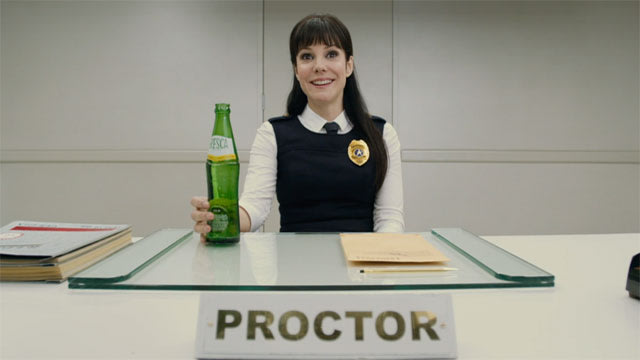Dir. by Edgar Wright - 2 hrs. 1 min.
Official Trailer #1
by Clayton Hollifield
When you're going to do a comedy version of a genre film, there is a wide chasm waiting for potential filmmakers to stumble into. And that chasm exists between overt amateurism and professional polish. Anything that falls in between those two goalposts is going to pull viewers out of the film. Good gags and scenarios will get you pretty far, but when it comes down to the action-filled climax, the goods must be delivered. That, or it needs to be so absurdly, recklessly, irresponsibly stupid that all you can do is sit there and laugh that the filmmakers tried to get away with whatever they're trying to get away with (like the mansion fire near the end of "Orgazmo," or the bus-leap in "Spice World"). Yes, "Hot Fuzz" works as a comedy, but the action is passable, too.
Nicholas Angel (Simon Pegg) is an overachieving, driven London Police Officer who's enthusiasm and skill at his job is making everyone else look bad. He's given a "promotion," a better title in a rural village in the countryside, much to his co-workers' delight. Nicholas arrives in Sandford to find a cozy model community, where things like teens in hoodies and gold-painted mimes are the scourge of the town. Nicholas is paired with PC Danny Butterman (Nick Frost), the sort of slow, yet enthusiastic son of the police chief. A series of mysterious deaths in Sandford convince Nicholas that a murderer is on the loose, but finding proof proves difficult.
The first hour of "Hot Fuzz" is flat-out hilarious. Once Nicholas' stern, by-the-books character is established (and it takes all of about a minute to do that, with one of director Edgar Wright's signature near-montage sequences), literally everyone and everything starts hammering away at him. It's an interesting approach, to show how an over-zealous approach (which is somewhat necessary to excel at anything) works in a real world where everyone is not even zealous, but complacent. At least his partner is ambitious (or envious, maybe both), but without skill, that ambition isn't worth a lot. The Angel character is an interesting flip from Pegg's character in "Shaun of the Dead"; instead of having to be roused to action, Nicholas is all tension and fury waiting to be unleashed, and must be forced into inaction. Nick Frost's character is also not the same thing as in their previous work; Danny is eager to please, whereas Ed was antagonistic and a drag on whomever was around him. It's very easy for comedians to slip into the same role and dynamic over and over again until every drop has been milked from it, but Frost and Pegg have avoided that completely here.
The second hour of the film when it turns direction into Nicholas vs. the baddies, and that's also when the action starts to take over a bit. Now, I'm not going to tell you that "Hot Fuzz" would be a standout film if it had to rely on its dramatic chops, but it's close enough that if you caught it on cable, you wouldn't think it stood out as being incompetent either. That's something that sometimes sabotages comedies; the people involved in making something think that just seeing Adam Sandler run in slow-motion (to make up an example) is going to be funny enough to overshadow the lack of professional rigor that a dramatic film would require of the scene. Yes, it's pretty fun to see Simon Pegg atop a horse, armed to the teeth. Yes, it's awesome watching Nick Frost jump through the air whilst shooting two guns. But it's even better when the scenes make sense, work visually, and ALSO have Nick Frost jumping through the air whilst shooting two guns.
The result is that "Hot Fuzz" is a really good movie. The humor's great, the action stuff works, there's some visual flair in the direction and action, and it's paced very well, without lulls. I like "Hot Fuzz" better than "Shaun of the Dead," and that might just be because I like cop movies better than zombie movies. Your mileage might just vary. But if you like one, I'm pretty sure you'll like the other. So I'll just shut up so you can get to watching "Hot Fuzz" and laughing along.
4 / 5 - Streaming

